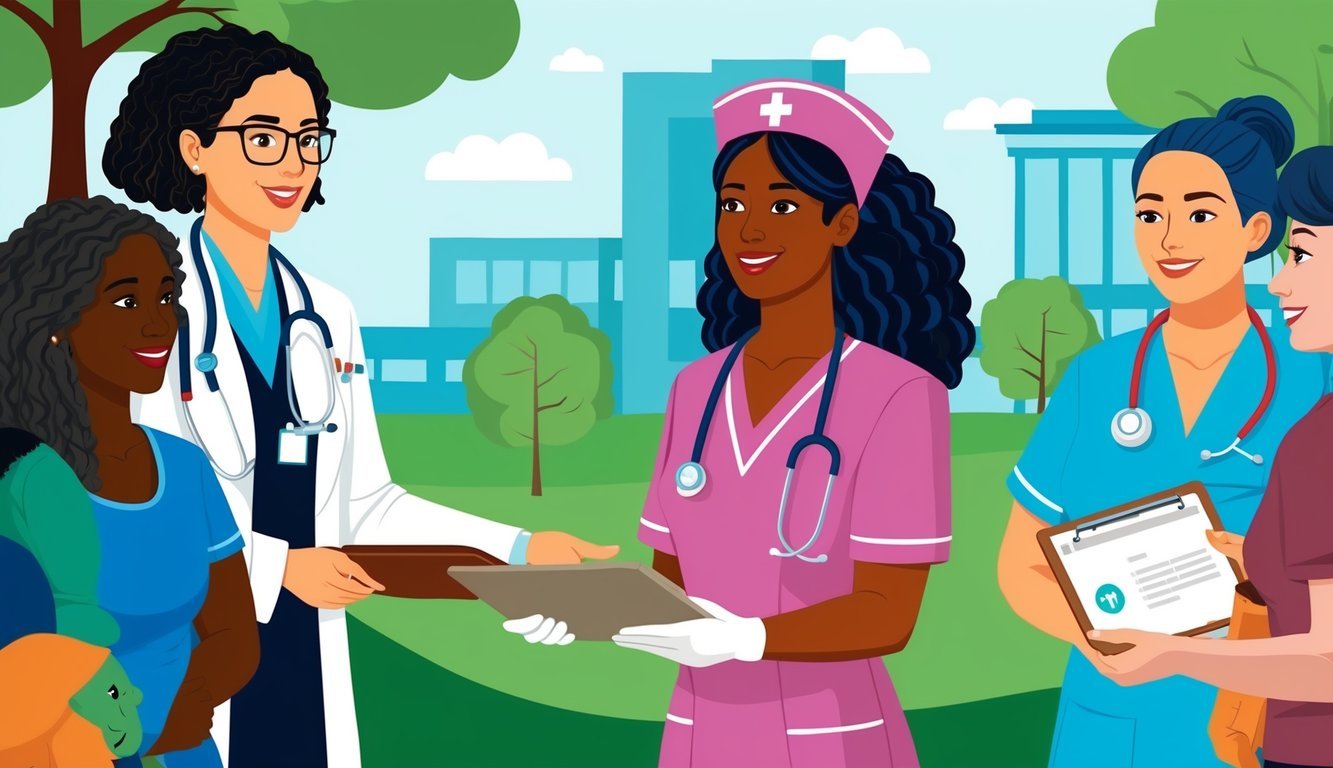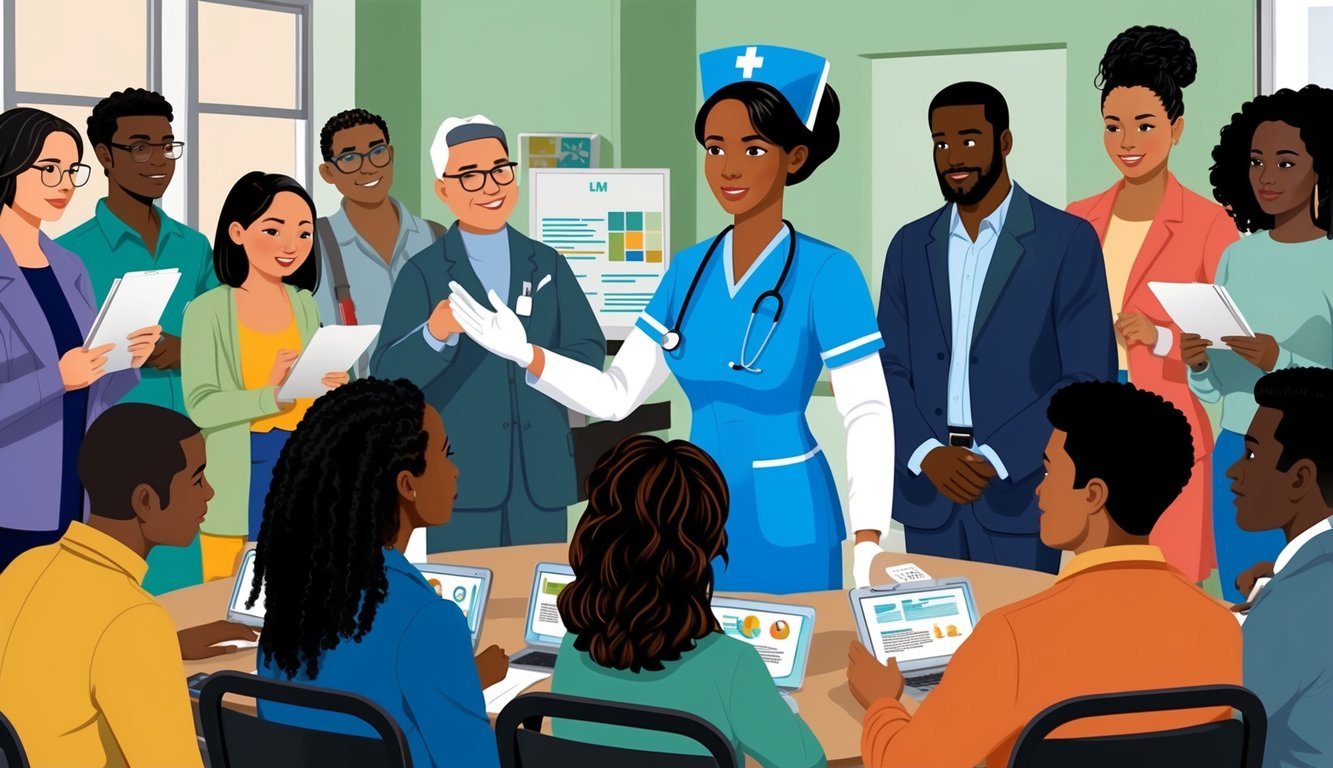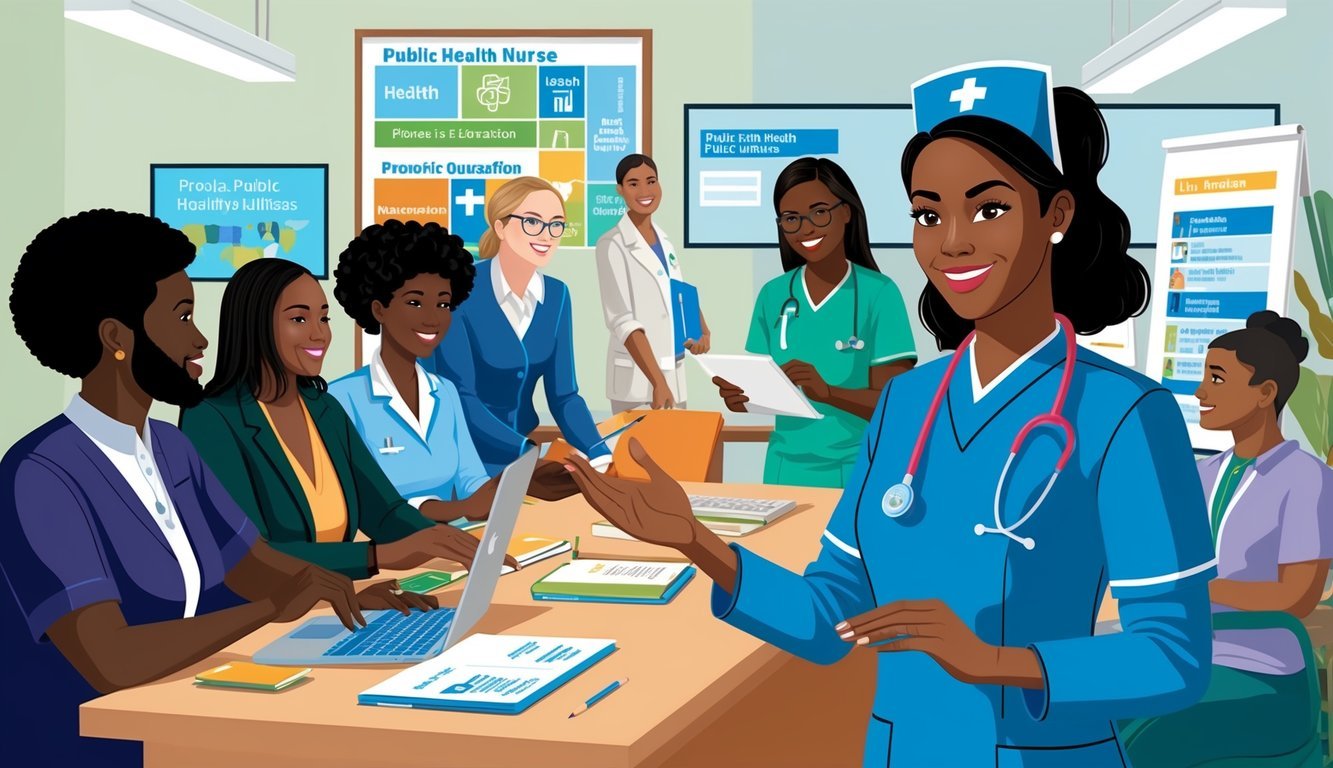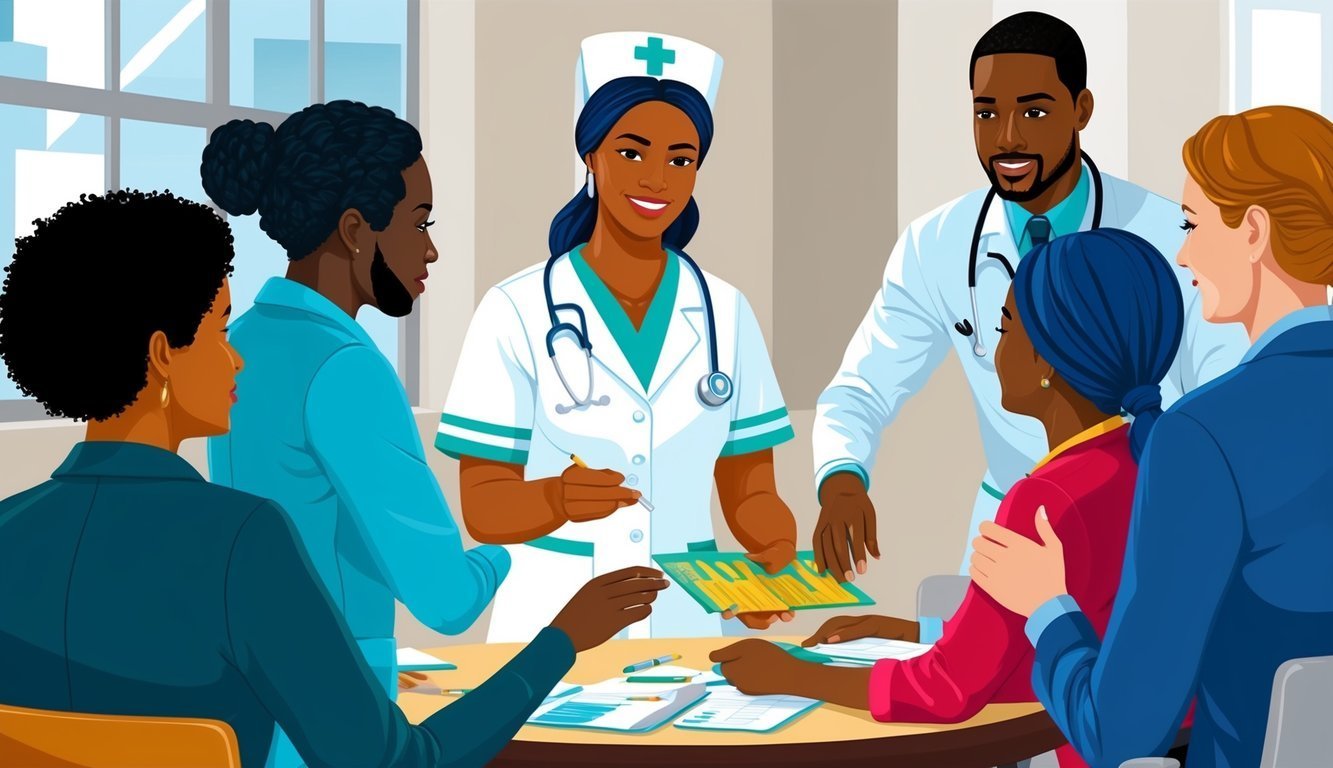Becoming a public health nurse allows you to make a significant impact on community health while enjoying a rewarding career.
To embark on this path, you need to obtain a Bachelor of Science in Nursing (BSN) and become a registered nurse (RN).
This educational foundation is essential for entering the field of public health nursing.
Public health nurses focus on health promotion and disease prevention in various communities, working in settings such as schools, clinics, and government agencies.
They play a vital role in assessing health needs, organizing community programs, and advocating for policy changes that benefit public health.
To achieve this goal, you will need to complete not only your nursing education but also consider obtaining further certifications, such as the Certified in Public Health (CPH) credential.
Engaging in continuing education and specialized training can enhance your expertise and job prospects in this dynamic field.
For more information about the steps to become a public health nurse, explore resources like Nurse.org and Public Health Degrees.
The Path to Becoming a Public Health Nurse
To become a public health nurse, you will need to complete several key steps.
This includes obtaining the necessary education, securing your licensure, and considering advanced educational opportunities.
Each of these areas is crucial in preparing you for a successful career in public health nursing.
Educational Requirements
You must first pursue an accredited nursing program.
There are two primary educational pathways:
- Associate Degree in Nursing (ADN): A 2-year program that prepares you for basic nursing practice.
- Bachelor of Science in Nursing (BSN): A 4-year degree recommended for public health roles.
While both degrees allow you to take the NCLEX-RN exam for licensure, many employers prefer candidates with a BSN.
Additionally, a BSN is typically required for public health nursing certification.
For those aiming for a more extensive understanding of public health, consider further studies such as a Master of Public Health (MPH).
Licensure and Certification
After completing your nursing program, obtaining your nursing license is essential.
This involves passing the NCLEX-RN exam.
Once licensed as a Registered Nurse (RN), you can focus on public health.
For certification, many opt for the Certified Public Health (CPH) designation or the Public Health Nursing Certification (PHN).
The latter generally requires a BSN and relevant public health experience.
These certifications validate your expertise and are valuable for career advancement.
Advanced Educational Paths
If you are considering furthering your education, various advanced paths exist.
Options include:
- Master of Science in Nursing (MSN): Specialized training that enhances your leadership skills and knowledge in public health.
- Advanced Public Health Nursing Certification: This certification often requires an MSN and focuses on advanced public health practice.
These advanced paths equip you with deeper knowledge and skills required for roles in public health policy, administration, or academia.
Completing these programs can significantly increase your career opportunities and earning potential in the field.
For more detailed guidance on nursing programs, visit resources like Nurse.org and NurseJournal.org.
Roles and Responsibilities

As a public health nurse, you will engage in a variety of roles that combine clinical skills, community outreach, and policy development.
Your focus will include disease prevention, health education, and advocating for community health needs.
Clinical Skills and Health Education
In this role, you will utilize your clinical skills to conduct health assessments, provide direct patient care, and administer vaccinations.
For instance, you will be responsible for immunizations and infection control measures within the community.
You will educate individuals and groups about health promotion and disease prevention strategies.
Examples of topics include nutrition, exercise, and chronic disease management.
Creating informative materials and workshops can help enhance public knowledge and resilience.
Additionally, your background in epidemiology allows you to analyze health data and trends, guiding effective health education initiatives tailored to specific population needs.
Advocacy and Community Outreach
A key responsibility of public health nursing is advocacy.
You will work to influence health policies and promote access to healthcare services for underserved populations.
This includes identifying barriers to care and ensuring community voices are heard.
Community outreach activities, such as health fairs and informational sessions, are essential.
You will engage with local organizations to raise awareness about health issues and facilitate access to resources.
Building relationships with community leaders can enhance collaborative efforts.
This fosters an environment where health initiatives are supported and embraced by the community.
Policy Development and Research
Your role also extends into policy development and research.
You will participate in assessing community health needs and using this data to advocate for program funding and resource allocation.
Conducting research on public health issues will help identify effective strategies for disease prevention and health promotion.
Collaborating with governmental and non-governmental organizations can advance community health objectives.
Staying informed about policies and advancements in public health will enable you to contribute to discussions that shape health legislation and programs, ensuring the community’s health needs are met.
Workplace and Opportunities

Public health nurses (PHNs) find employment in various settings that prioritize community health.
Understanding where these professionals work and the specialized opportunities available can enhance your career prospects and job satisfaction.
Healthcare Facilities and Agencies
PHNs are commonly employed in diverse healthcare facilities and agencies.
Key workplaces include:
- Public Health Departments: These local and state agencies focus on improving community health through education and disease prevention.
- Community Health Centers: Often serving low-income populations, these centers provide essential health services and promote wellness.
- Outpatient Clinics: Offering preventative care, these clinics are vital for managing chronic diseases and providing health education.
- Government Agencies: Such as the Centers for Disease Control and Prevention (CDC), these agencies support public health initiatives and emergency preparedness.
- Schools: Offering health programs and screenings to students, PHNs in schools play a crucial role in promoting health within educational settings.
These environments offer rich employment opportunities, often with competitive salaries.
According to various reports, the median salary for a public health nurse is around $58,230 per year.
Specialized Opportunities and Growth
As a public health nurse, specialized opportunities primarily come from various sectors.
These include:
- Disaster Relief: Working with organizations to provide immediate healthcare services during emergencies.
- Community Clinics: Focusing on underserved populations, these settings require skills in outreach and education.
- Voluntary Organizations: Collaborating with groups like the American Public Health Association allows for greater networking and resource sharing.
The job outlook for PHNs remains strong, driven by increasing employment demand in public health.
The National Board of Public Health Examiners provides certification that can enhance your qualifications.
Continuous professional development is essential for growth in roles focused on evolving health challenges and community needs.
Populations Served and Community Impact

Public health nurses play a crucial role in addressing the healthcare needs of diverse populations.
By focusing on vulnerable groups and promoting healthcare access and equity, they can significantly enhance community well-being.
Vulnerable Groups and At-Risk Communities
You will encounter various vulnerable populations as a public health nurse.
These include low-income communities, rural populations, and those facing systemic barriers to healthcare access.
Common risk factors for these groups often include:
- Limited education
- Unstable housing
- Food insecurity
Public health nurses conduct immunization drives and screenings to mitigate health risks.
They create outreach programs that raise awareness about available community resources such as health clinics and social services.
By addressing specific health concerns, you can empower these communities to take charge of their health outcomes.
Healthcare Access and Equity
Equity in healthcare means that everyone can access necessary services regardless of their circumstances.
Public health nurses assess healthcare access within their communities, particularly in underserved and at-risk populations.
You may implement strategies that include:
- Community health workshops
- Mobile clinics to reach remote areas
- Collaborations with local organizations to enhance service delivery
By evaluating existing barriers, you can advocate for policies that promote equal access to care.
This focus is vital in reducing health disparities and improving overall community health outcomes, ensuring that every individual receives the attention they deserve.
Continued Professional Development
Continued professional development is crucial for public health nurses to enhance their skills and adapt to the evolving healthcare landscape.
Engaging in further education and becoming involved in professional organizations can significantly improve your career prospects and knowledge base.
Further Education and Specializations
To advance as a public health nurse, pursuing further education is essential.
Obtaining a Master of Science in Nursing (MSN) can open doors to leadership roles and specialized fields such as healthcare administration or health informatics.
In addition to the MSN, you might consider certifications like the Certified Public Health Nurse (CPHN) or the Certified in Public Health (CPH) credentials.
These certifications demonstrate your competence in public health principles.
Specializations in areas like disaster management or social sciences can also enhance your ability to respond to diverse community needs.
Explore programs offered by the American Public Health Association or similar institutions to find suitable courses.
Involvement in Professional Organizations
Joining professional organizations like the Association of Public Health Nurses (APHN) can provide valuable networking opportunities.
These organizations often offer access to resources, conferences, and workshops on current public health issues.
Participating in such groups helps you stay informed about the latest advancements and best practices.
You can also connect with bilingual nurses or those from diverse backgrounds, enriching your professional experience.
Moreover, being involved in nonprofit organizations can enhance your understanding of community health challenges.
Active participation not only strengthens your skills but also contributes to your community’s well-being.
This can potentially influence your median salary positively, as experienced professionals are often compensated higher.

